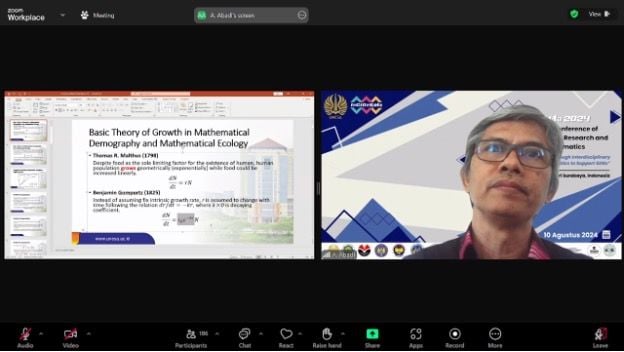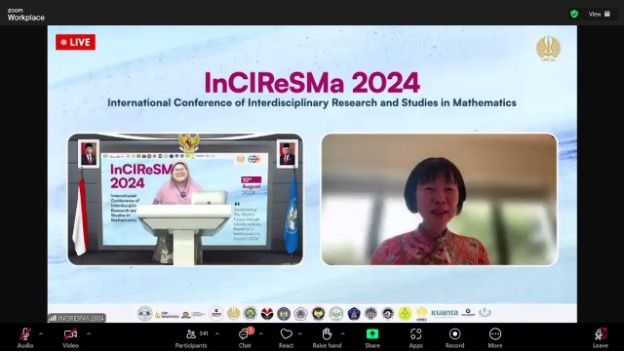
Assoc. Prof. Dr. Abadi from UNESA discusses the importance of updating the classic predator-prey model at InCiReSMa 2024.
Unesa. ac.id, SURABAYA—Faculty of Mathematics and Natural Sciences (FMIPA), Surabaya State University (UNESA) held the 2024 International Conference of Interdisciplinary Research and Studies in Mathematics (InCiReSMa) online on Saturday, August 10 2024.
As chairman of the InCiReSMa 2024 committee, Rudianto Artiono, said that this conference was a forum to encourage transformation and innovation in the field of mathematics. This conference, which covers 15 fields of mathematics, has the theme "Transforming World's Future through Interdisciplinary Research in Mathematics to Support SDGs"."Through this conference, it is hoped that various stakeholders can exchange ideas and innovative solutions that can be applied to solve complex problems to continue to push the boundaries of mathematical knowledge for mutual progress," he concluded.
The experts present included Asst. Prof. Alden Jack Edson of Michigan State University, Assoc. Prof. Wanty Widjaja, Ph.D. from Deakin University, Prof. Dr. Ali Akgül from Siirt University, Assoc. Prof. Dr. Abadi, M.Sc. from UNESA, and Prof. Ebenezer Bonyah, M.Ed., M.Sc., Ph.D. from Akenten Appiah-Menka.
As the first speaker, Assoc. Prof. Dr. Alden J. Edson explains innovations in teaching mathematics with the transition from printed to digital materials. He explained that many current digital materials do not take full advantage of technology, focusing on skills and symbolic manipulation.
"Digital platforms provide a more egalitarian learning experience and support better collaboration in the development of mathematical ideas," he explained.

Assoc. Prof. Wanty Widjaja was one of the speakers at inCIReSMa 2024. He emphasized the importance of a structured approach in improving the quality of education.
The research focuses on on the development of a collaborative digital platform for the Connected Mathematics Project (CMP) curriculum, which provides individual and collaborative features for students, as well as a dashboard for teachers. Students can access and edit CMP materials, as well as share and integrate group work in individual assignments. Teachers can monitor and provide feedback with students in real-time.
Similarly to Assoc. Prof. Wanty Widjaja, Ph.D., in his presentation raised the issue of the importance of overcoming traditional teaching approaches. The reason is that there needs to be a structured approach in achieving inclusive and equitable quality education in accordance with UNESCO's Sustainable Development Goals (SDGs).
"To teach mathematics and science in an interdisciplinary manner, teachers must develop adaptive skills that can be built through collaboration in planning, teaching, and reflecting together," he explained.
Flexibility and deliberate practice emerge when teachers adjust lesson components based on student abilities. However, key challenges such as limited time, space, differences in student abilities, and curriculum alignment remain.
As a solution, he underscores the importance of ongoing support for teachers in developing adaptive skills through collaborative and reflective practice.
In the field of mathematics, especially biomathematics, Assoc. Prof. Dr. Abadi discusses the importance of updating the classic predator-prey model. He explained that considering carrying capacity as a variable, no longer a constant.
"Global environmental changes require us to adopt a more realistic model, where carrying capacity acts as a dynamic function influenced by various environmental factors ," he said.
His research shows that changes in carrying capacity can cause various types of bifurcations, such as transcritical and Hopf bifurcations, which indicate changes in stability in the ecological system. The case studies also reveal how variations in system parameters, such as refuge use for prey and trophic function, can trigger other bifurcations such as saddle-nodes, which have implications for the emergence of bistability in ecosystems.
The conference is part of the Konaspi series Hundreds of participants attended XI 2024 and not only provided theoretical insight into the basics of mathematics, but also had significant practical applications in its application. This is to design strategies in both the education and scientific fields that are more effective and adaptive. [*]
***
Reporter: Mohammad Dian Purnama (FMIPA)
Editor: @zam*
Photo: Tim UNESA Public Relations
Share It On:






